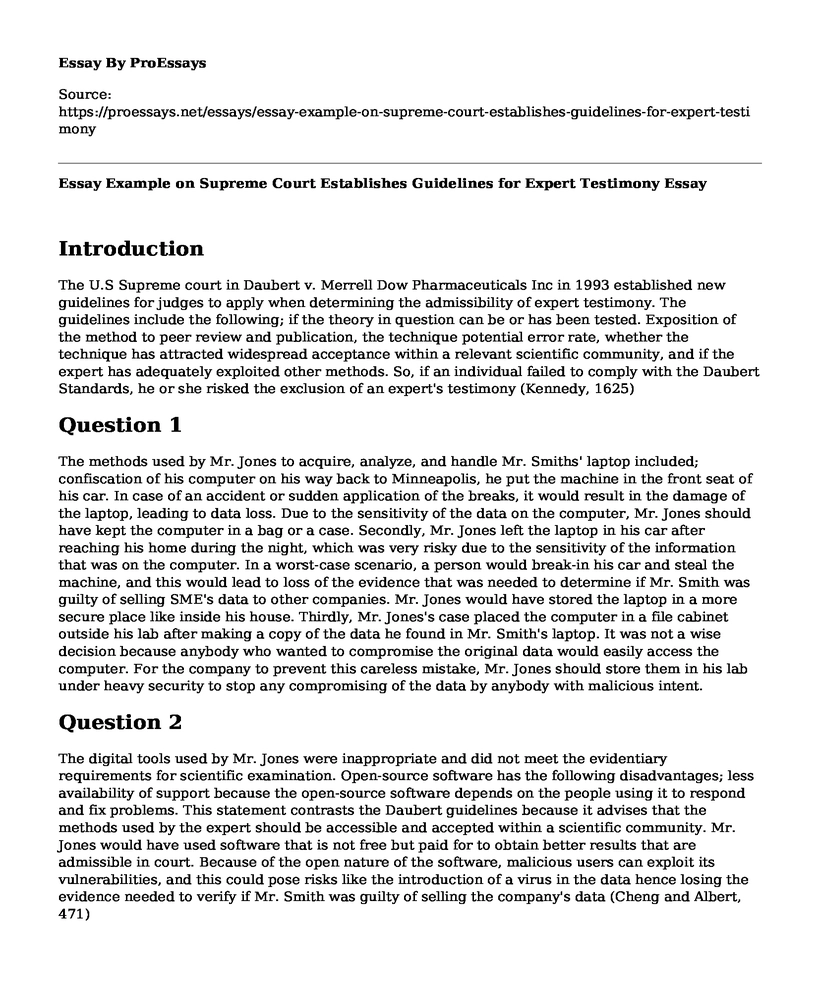Introduction
The U.S Supreme court in Daubert v. Merrell Dow Pharmaceuticals Inc in 1993 established new guidelines for judges to apply when determining the admissibility of expert testimony. The guidelines include the following; if the theory in question can be or has been tested. Exposition of the method to peer review and publication, the technique potential error rate, whether the technique has attracted widespread acceptance within a relevant scientific community, and if the expert has adequately exploited other methods. So, if an individual failed to comply with the Daubert Standards, he or she risked the exclusion of an expert's testimony (Kennedy, 1625)
Question 1
The methods used by Mr. Jones to acquire, analyze, and handle Mr. Smiths' laptop included; confiscation of his computer on his way back to Minneapolis, he put the machine in the front seat of his car. In case of an accident or sudden application of the breaks, it would result in the damage of the laptop, leading to data loss. Due to the sensitivity of the data on the computer, Mr. Jones should have kept the computer in a bag or a case. Secondly, Mr. Jones left the laptop in his car after reaching his home during the night, which was very risky due to the sensitivity of the information that was on the computer. In a worst-case scenario, a person would break-in his car and steal the machine, and this would lead to loss of the evidence that was needed to determine if Mr. Smith was guilty of selling SME's data to other companies. Mr. Jones would have stored the laptop in a more secure place like inside his house. Thirdly, Mr. Jones's case placed the computer in a file cabinet outside his lab after making a copy of the data he found in Mr. Smith's laptop. It was not a wise decision because anybody who wanted to compromise the original data would easily access the computer. For the company to prevent this careless mistake, Mr. Jones should store them in his lab under heavy security to stop any compromising of the data by anybody with malicious intent.
Question 2
The digital tools used by Mr. Jones were inappropriate and did not meet the evidentiary requirements for scientific examination. Open-source software has the following disadvantages; less availability of support because the open-source software depends on the people using it to respond and fix problems. This statement contrasts the Daubert guidelines because it advises that the methods used by the expert should be accessible and accepted within a scientific community. Mr. Jones would have used software that is not free but paid for to obtain better results that are admissible in court. Because of the open nature of the software, malicious users can exploit its vulnerabilities, and this could pose risks like the introduction of a virus in the data hence losing the evidence needed to verify if Mr. Smith was guilty of selling the company's data (Cheng and Albert, 471)
Question 3
Using the Daubert Standard, the following is considered by a judge when determining if expert witness testimony is relevant and reputable. The basis of the evidence should be on scientific reasoning. Then the proof should be appropriately applied to the facts at issue. Mr. Jones used scientific reasoning while analyzing the contents of the laptop using various tools. He also correctly applied to the facts by obtaining soft and hard copies of Mr. Smith's illegal activities as proof. Hence, Mr. Jones would be considered as an expert witness in a court of law (Giannelli, 28).
In summary, there are guidelines to be followed by an expert witness when analyzing evidence and a judge when considering if a person is fit to be an expert witness or not. These guidelines prevent unreliable testimonies from being heard in a court of law.
Works Cited
Cheng, Edward K., and Albert H. Yoon. "Does Frye or Daubert matter? A study of scientific admissibility standards." Virginia Law Review (2005): 471-513.
Kennedy, Donald. "Forensic science: an oxymoron?" (2003): 1625-1625.
Giannelli, Paul C. "Admissibility of scientific evidence." Okla. City UL Rev. 28 (2003): 1.
Cite this page
Essay Example on Supreme Court Establishes Guidelines for Expert Testimony. (2023, Mar 28). Retrieved from https://proessays.net/essays/essay-example-on-supreme-court-establishes-guidelines-for-expert-testimony
If you are the original author of this essay and no longer wish to have it published on the ProEssays website, please click below to request its removal:
- Do Background Checks Actually Work to Deter Crime? - Essay Sample
- Essay Sample on Plea Bargaining and Decision Making
- Research Paper on State Laws
- Gay Right Movements in the US Essay Example
- Essay Sample on Civil Rights Movement: A Template for Change
- Essay Example on Technology and Privacy: Big Brother Is Watching?
- Gender Disparity in Criminal Sentencing: Examining Inequalities - Research Paper







